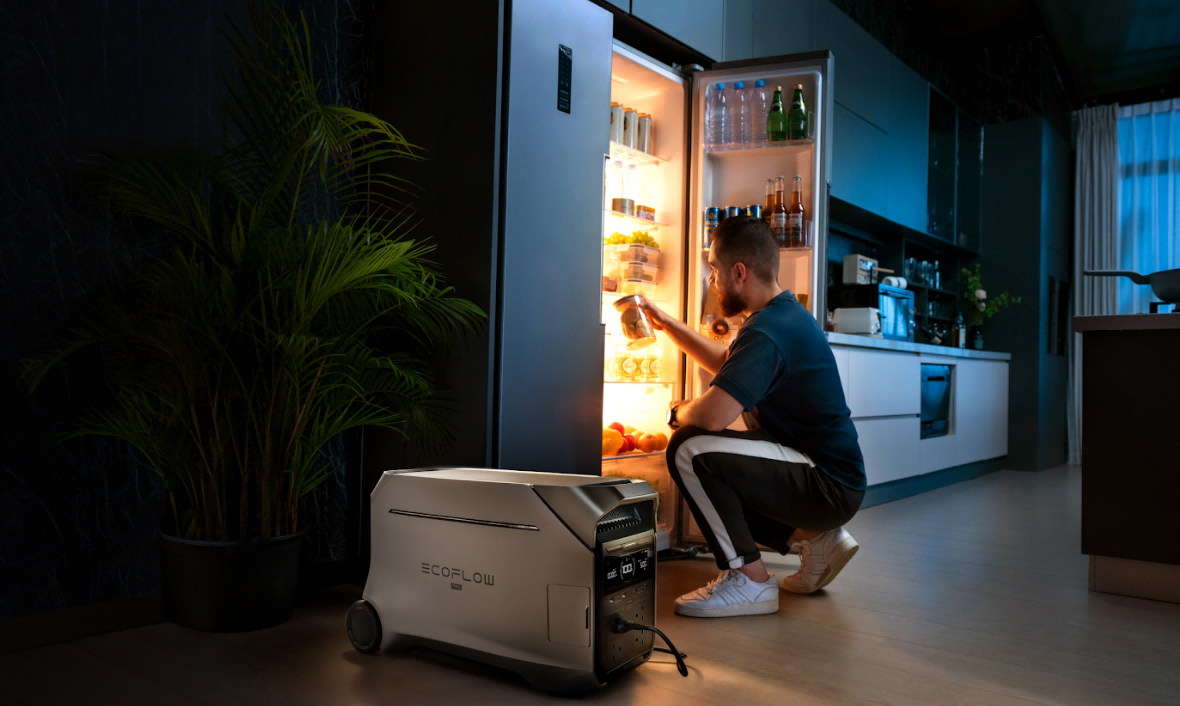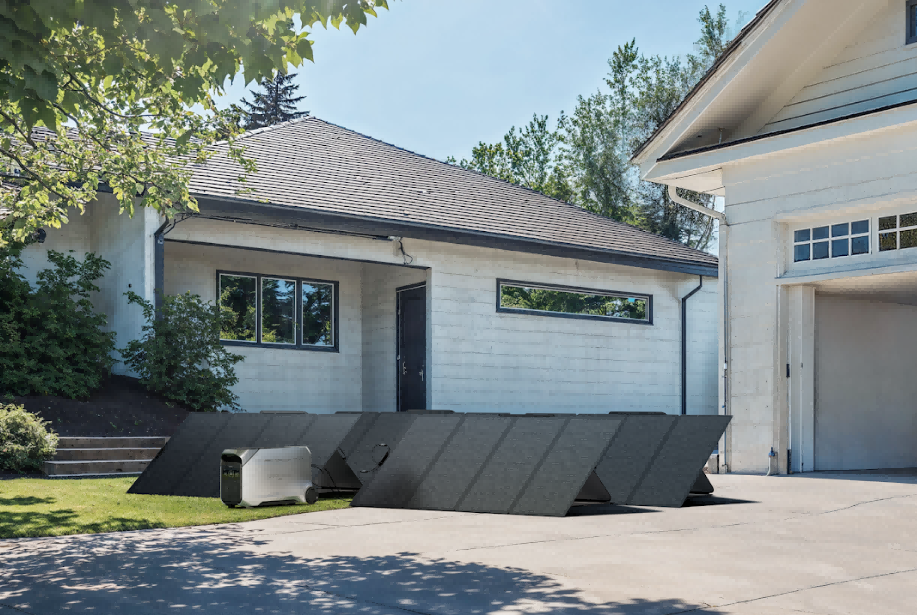Are Home Backup Generators Worth the Investment?
Power outages are a pain. If you're ready to stop worrying about them, a home backup generator is worth considering. Unlike portable units, these are permanently installed, usually running on natural gas, propane, or diesel, and wired to your home with an automatic transfer switch so they start on their own during an outage. While they offer great convenience and security, they're also a significant expense. Is it worth it for you? This article explores the benefits, drawbacks, and important factors to help you make an informed decision.
What Are the Benefits of a Home Backup Generator?
Having a home backup generator offers several important advantages that can make a real difference during a power outage, from basic comfort to critical safety.
Safeguard Critical Medical and Home Safety Systems
Ensure vital electric medical equipment (like CPAP machines or refrigerated medications) keeps running reliably. Prevent basement flooding by powering sump pumps, maintain access to essential water from well pumps, and keep home security systems and electric door locks operational. Sufficient lighting also reduces fall risks in the dark.
Protect Finances by Preventing Damage and Disruptions
Avoid significant financial setbacks: prevent hundreds of dollars in spoiled food as refrigerators and freezers keep running. In cold weather, prevent costly pipe bursts by maintaining heat. For those who work from home or run a home business, ensure productivity and avoid lost income. You can also save on hotel bills or extra meal costs during extended outages.
Maintain Everyday Comfort and Household Routines
Keep daily life as normal as possible. Heating and air conditioning (HVAC) systems continue to operate for comfort in extreme weather. Enjoy general lighting, and use essential appliances like your refrigerator and freezer for normal meal preparation, your stove for cooking meals, and have hot water available. Powering your internet router and TV keeps you connected and informed.
Enjoy Reliable Automatic Operation and Greater Peace of Mind
Benefit from the "set it and forget it" nature of an automatic standby generator. It starts automatically when power fails—no need to act in bad weather or darkness—and provides a quick, smooth transition to backup power. This seamless reliability significantly reduces stress, offering invaluable peace of mind.
Potentially Increase Your Home's Resale Value
A built-in generator can be a highly attractive feature for homebuyers, especially where power outages are common. It can make your home stand out and potentially sell faster or for a better price.
Home Backup Generator: A Full Cost Breakdown
While the benefits we just discussed are appealing, it's important to have a realistic understanding of what a home backup generator will cost. There are initial purchase and installation fees, as well as ongoing expenses.
Initial Outlay: Generator, Transfer Switch, and Installation
The biggest single expense is the generator unit itself. The price depends on its power output (measured in kilowatts, or kW), the brand, and any extra features. A smaller unit might just power the essentials, while a larger one can run your whole house, and the price will reflect that difference.
An Automatic Transfer Switch (ATS) is another key component. This is the device that senses a power outage, tells the generator to start, and then switches your home's power supply from the utility line to the generator. When grid power comes back, it switches back and shuts the generator off. It's essential for automatic operation and adds to the cost.
Installation costs are also significant and typically include:
Electrical work: A licensed electrician needs to connect the generator and ATS to your home’s electrical panel.
Fuel connection: If you choose a natural gas or propane model, a plumber or gas fitter will need to install a fuel line.
Concrete pad: Generators need a stable, flat surface, usually a concrete pad.
Permits and inspections: Most areas require permits for this type of installation, and inspections add to the cost.
Ongoing Expenses: Fuel Consumption & Regular Upkeep
The expenses don't stop after installation. You'll need to pay for fuel. Natural gas units will increase your gas bill, and propane units require tank refills (and sometimes tank rental fees). Diesel also needs to be purchased and stored. The generator uses fuel during outages and also for its regular self-test cycles.
Regular maintenance is also necessary to keep the generator reliable. Most units run self-tests. Beyond that, annual professional servicing is usually recommended. This typically covers oil and filter changes, battery checks, and other inspections. Like any engine, parts may occasionally need repair or replacement over the years.
Other Points to Consider
Beyond the direct costs, think about a few other practical things:
- Space: The generator needs a suitable outdoor spot with enough clearance for airflow and maintenance.
- Noise: All generators make some noise. Models vary, so check the decibel ratings and consider how it might affect you and your neighbors.
- Local Rules: Check for any local ordinances or HOA rules about generator placement, noise, or fuel storage before you buy.
Are Home Backup Generators Worth the Investment? Six Key Questions to Consider
Yes, a home backup generator can indeed be a worthwhile investment, providing significant value, security, and peace of mind in the right circumstances. The key to determining if it’s the right investment for you lies in carefully evaluating your specific situation, potential losses, and the tangible and intangible returns a generator can offer. Consider these questions to assess its true value to your household:


How Often – and For How Long – Do Power Outages Typically Disrupt Your Life?
Consider the history of power outages in your area. Are they frequent and long, or rare and short? Is your local power grid known for being unreliable, or are you in an area prone to severe weather (hurricanes, ice storms, etc.) that often causes outages? If you regularly lose power for extended periods, and find these disruptions significantly impact your routine or peace of mind, the value of a generator that prevents this will be much higher for you.
What Must Keep Running in Your Home if Power Fails?
Think about what absolutely must have power in your home to maintain safety, health, and basic functions.
- Is anyone reliant on electric medical equipment, like a CPAP machine, an oxygen concentrator, or needs refrigerated medications?
- Do you have a sump pump that needs to run to prevent costly basement flooding?
- Is a well pump your only source of water?
- Do you work from home and need consistent power and internet to maintain your income?
- Are there vulnerable people in your home, like infants or elderly individuals, who are more affected by temperature changes or lack of light?
If you answered "yes" to some of these, especially those critical for health, safety, or preventing major property damage, a generator shifts from being a luxury to a crucial investment in protection and well-being.
When Does Your Local Climate Make Power Outages Truly Problematic (Dangerous or Costly)?
If you live where temperatures get extreme, a generator can be vital in turning a problematic outage into a manageable one. Losing heat in a freezing winter isn't just uncomfortable; it can lead to burst pipes and thousands of dollars in repairs. Similarly, losing air conditioning in a scorching summer can be dangerous, particularly for vulnerable individuals. Assess how your climate might transform a power outage into a situation with severe financial or health consequences, thereby increasing the protective value of a generator.
Realistically, What's Your Budget for a Generator System vs. the Potential Costs of Not Having One?
Be honest about what you can afford, both for the upfront purchase and installation of a generator, and for its ongoing fuel and maintenance costs. Then, weigh this investment against the potential cumulative costs you might face over time without a generator. These could include spoiled food after every significant outage, emergency repairs for damage like burst pipes, lost income if you can't work from home, or even the expense of temporary relocation during prolonged disruptions. This comparison is key to understanding the financial aspect of its worth.
Beyond Money, How Much is Eliminating Outage Stress and Disruption Worth to Your Household?
This is a personal one, but very important in determining overall value. How much does a power outage disrupt your family's life and elevate stress levels? Some people can manage fine with flashlights and a bit of patience. For others, the loss of power is a major ordeal, causing significant anxiety and upheaval. Consider the intangible value of maintaining normalcy, comfort, and peace of mind for your household when deciding if a generator is a worthwhile investment.
For the Best Value, What Needs to Be Powered: Just Essentials, or Your Whole Home?
The size of your home and how much of it you want to power during an outage will directly influence the generator's size and its total cost. To ensure you're getting the best value for your investment, decide what truly needs to be powered. Do you need to run everything as normal (whole-house power), which offers maximum convenience but at a higher cost? Or would powering just the essentials (like the refrigerator, heating/cooling systems, some lights, and critical medical or work equipment) be sufficient and provide a better return on your investment? Powering only essentials can significantly lower the initial cost while still covering your most important needs.
What Are the Alternatives to a Home Backup Generator?
A whole-home standby generator is a big step. Before committing, it's good to know about other options.
| Alternative | Typical Upfront Cost | Powers | Typical Runtime | Operation | Noise & Safety Considerations | Placement | Key Drawbacks | Ideal Use Case |
| Portable Generators | Lower | Some essential appliances, tools | Requires frequent refueling | Manual | Noisy; Serious CO poisoning risk (must use outdoors, far from house) | Outdoors, portable | Manual setup in outages (often bad weather), less power, refueling, safety risks | Temporary power for some essentials; users comfortable with manual operation. |
| Battery Backup Systems | Higher | Electronics, some appliances; larger systems for more | Varies by capacity/load; high-power appliances may have limited run. Recharges (solar can speed up) | Automatic | Quiet, no fumes | Often indoors; can integrate with solar | Higher cost for significant capacity; limited high-draw runtime without large system | Quiet, emission-free backup; good for electronics, some appliances; solar users. |
| UPS (Uninterruptible Power Supply) | Low | Low-power electronics (computers, routers) | Very short (minutes) | Automatic | Quiet, no fumes | Indoors, near devices | Very short runtime; only for low-power devices; not for appliances/lighting | Protecting sensitive electronics from brief outages/surges; safe shutdown. |
| Basic Preparedness (Non-Tech Solutions) | Lowest | N/A (provides non-electric solutions like light, food) | N/A (depends on supplies) | Manual | N/A | N/A | No electrical power; not for medical devices, sump pumps, or appliances | Coping with very short, infrequent outages; supplements other solutions. |
Each solution detailed in the table offers a different balance of cost, capability, and convenience. Evaluate these alternatives carefully, alongside the comprehensive protection of a home backup generator, to determine the best fit for your specific power needs and household priorities.


Assess Your Power Backup Needs!
A home backup generator is a major investment that pays off when your circumstances align with its benefits. Your decision should center on how often you lose power, what must keep running in your home, and whether extreme weather makes outages dangerous or costly. For families with medical equipment, frequent long outages, or harsh climates, generators become essential rather than optional. If your outages are rare and brief, portable generators or battery systems may better fit your needs and budget. Honestly evaluate your situation using the questions above—the right power solution depends entirely on your specific circumstances.